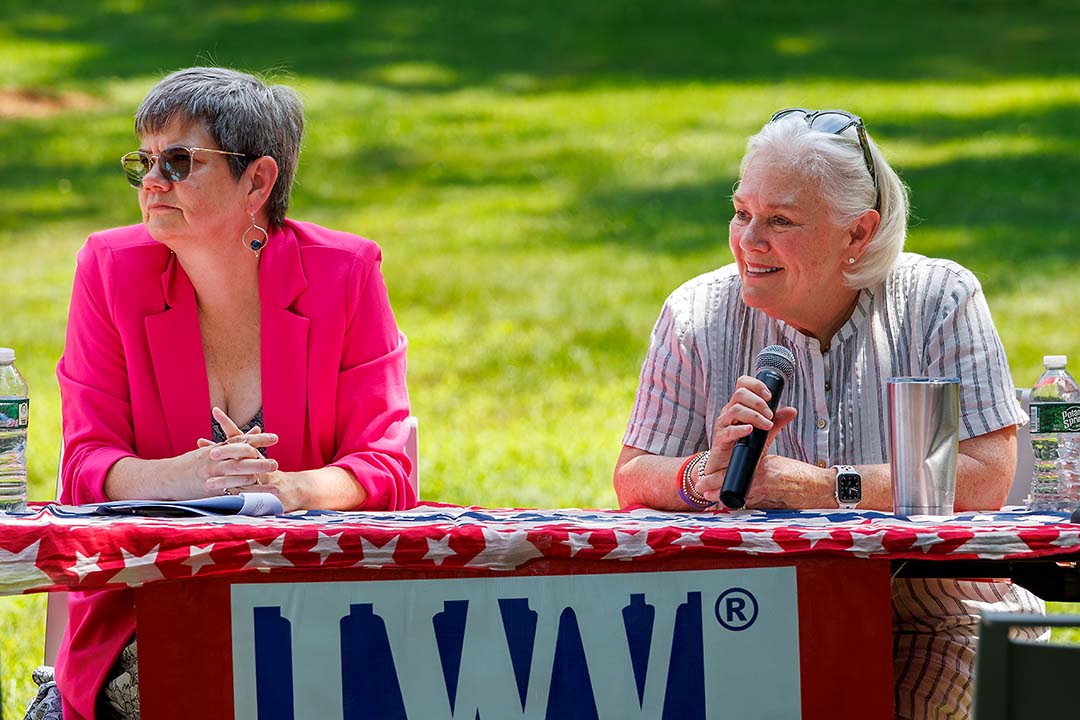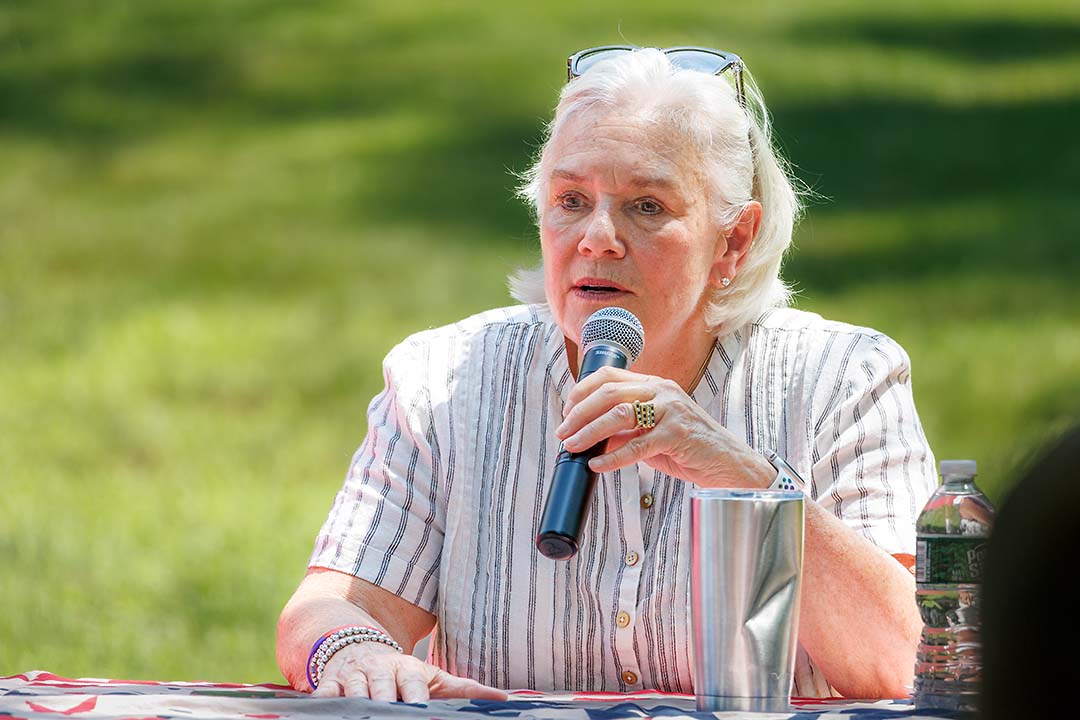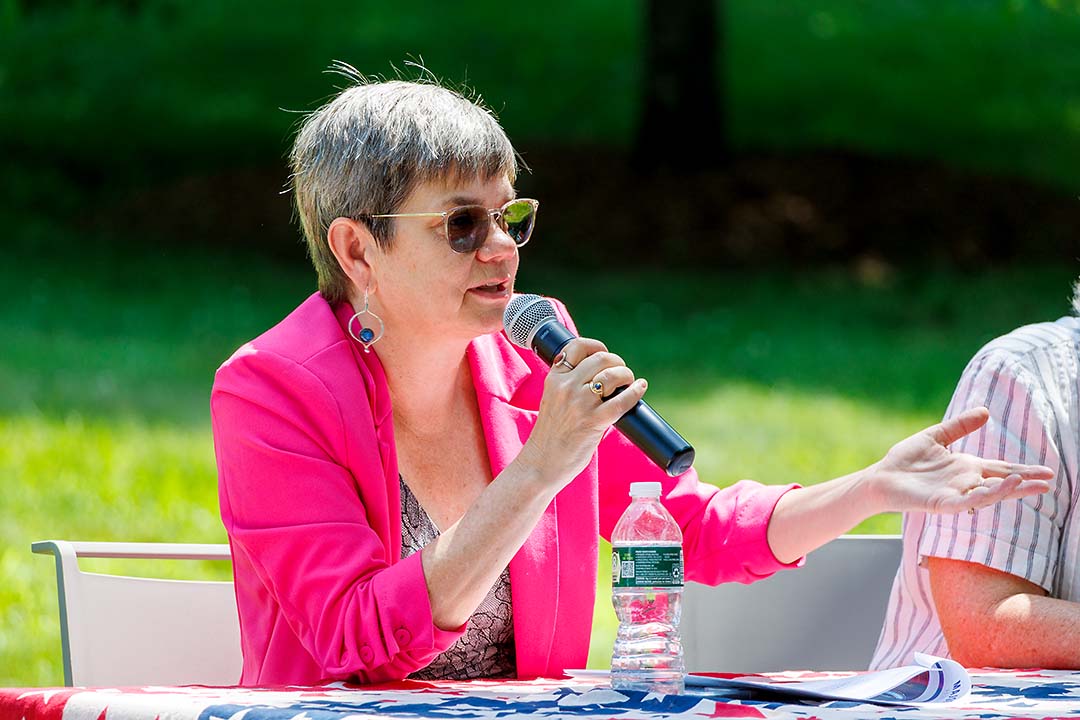Legislators Discuss Legislation

Weston Today photos
The housing bill and legislation about childcare, school safety, climate change, and other matters were topics of discussion on Saturday with State Senator Ceci Maher and State Rep. Anne Hughes at the annual League of Women Voters “Politics & Pie” community conversation.
At press time, H.B. 5002 — the affordable housing bill passed with the support of both legislators — still awaits action by Governor Ned Lamont. He has until Tuesday to sign, veto, or let it become law without his signature.
Two weeks ago most observers expected the governor to sign the bill, largely because his own staff was involved in its drafting. A backlash of opposition from many parts of the state (not just Fairfield County, as some claim) appears to have shifted the ground. Allowing the bill to go into effect without the governor’s signature seems to be the least likely outcome.
That leaves a veto or a signature. The governor says the latter would be conditioned on an agreement with legislative leaders about changes that would be made in a special session. Mr. Lamont has publicly said including affordable housing allocations in the bill was “an unnecessary provocation” and “kind of dumb.”
Rep. Hughes said a special session is already expected to be held in the autumn, after the federal government’s budget passes Congress and the governor and legislature assess its impact on Connecticut. Ms. Hughes said special sessions usually last one day.
More on the housing bill in a minute. Senator Maher and Rep. Hughes began the conversation with a recap of legislative highlights.
Childcare, school safety

Senator Maher said she is “super excited” about provisions in the state budget that create an early childhood endowment, a measure she championed.
She said the endowment, the first of its kind in the nation, would be funded each year from unallocated surpluses. The money would increase the number of childcare sites, renovate existing ones, and support childcare providers with training, parity in pay, and the opportunity to get health insurance.
Over the next few years, said the senator, the measure will produce as many as 16,000 additional sites in Connecticut for birth-to-five childcare. Parents making less than $100,000 will be able to get childcare for free, and the cost of care for those making more will be no greater than seven percent of their income.
Ms. Maher said she is also proud of passing legislation inspired by a suggestion from Westport students to provide $20 million in bond funds to school districts for enhanced safety systems, including rapid response equipment that directly alerts police departments to an emergency.
Medicaid, climate change, electric bills

Rep. Hughes said this year’s session raised Medicaid provider rates, the first such increase in several years. Ms. Hughes said the lower rates “left federal matching funds on the table.” She said that out of Connecticut’s 3½ million citizens, 900,000 receive Medicaid assistance, largely children and residents of nursing homes.
Rep. Hughes also hailed passage of two climate change bills, one aiming to reduce greenhouse gas emissions and achieve net-zero by 2050. Another offers investment and incentives to businesses to strengthen the state’s ability to defend against the effects of flooding and rising sea levels.
Ms. Hughes said an energy bill should provide at least a measure of relief to electricity ratepayers and “harden the electrical grid.” She said bonding will shift the burden of storm recovery costs away from residential electric bills.
Comments and questions
The discussion included a brief conversation about a bill passed this year that would allow striking workers to receive unemployment benefits for the duration of a strike, after a two-week waiting period. Senator Maher and Rep. Hughes both voted for the bill. Governor Lamont had already pledged to veto it.
School lunches are “appalling,” said one participant, wondering if the legislators can do anything about it.
Local school districts select their own food providers, said Rep. Hughes, and few have their own kitchen. She said corporate food providers supply pre-made, processed food and “sell it cheap.” She added that “kids hate it.”
Senator Maher rued the elimination of a budget for universal school breakfasts, which were offered for two years during the pandemic using federal funds. A pilot program to source from local farmers was part of the program, now gone. “We give kids Chromebooks but don’t feed them,” said Ms. Maher.
Housing
Asked about Weston’s affordable housing allocation of 383 units — and the town’s total 1,532 — Rep. Hughes said H.B. 5002 does not mandate building that many. The mandate, she said, is to submit plans. She noted that towns have the right to appeal their allocation.
Rep. Hughes emphasized that the bill does not require towns to pay for infrastructure needed for development, and said “a lot of sections don’t materially affect Weston at all.”
Ms. Hughes said the numbers are “aspirational allocations” and “a goal, the 25 percent that can be achieved in the next five to ten years.”
Senator Maher agreed, saying there is little likelihood Weston could absorb 1,500 new dwellings, given the town’s dearth of wastewater infrastructure and transit.
“Everyone who hates this bill sees it as the end of world as we know it,” said Ms. Maher. “I’m looking at it as a senator and for the entire state of Connecticut.”
She said industry and business leaders plead for more housing and that it is critical for the health and growth of the state’s economy.
“Our cycle for housing is broken,” said the senator. She said if she wanted to downsize her own home, which would make room for a young family to move in, she couldn’t. “There’s no place for me to go.”

